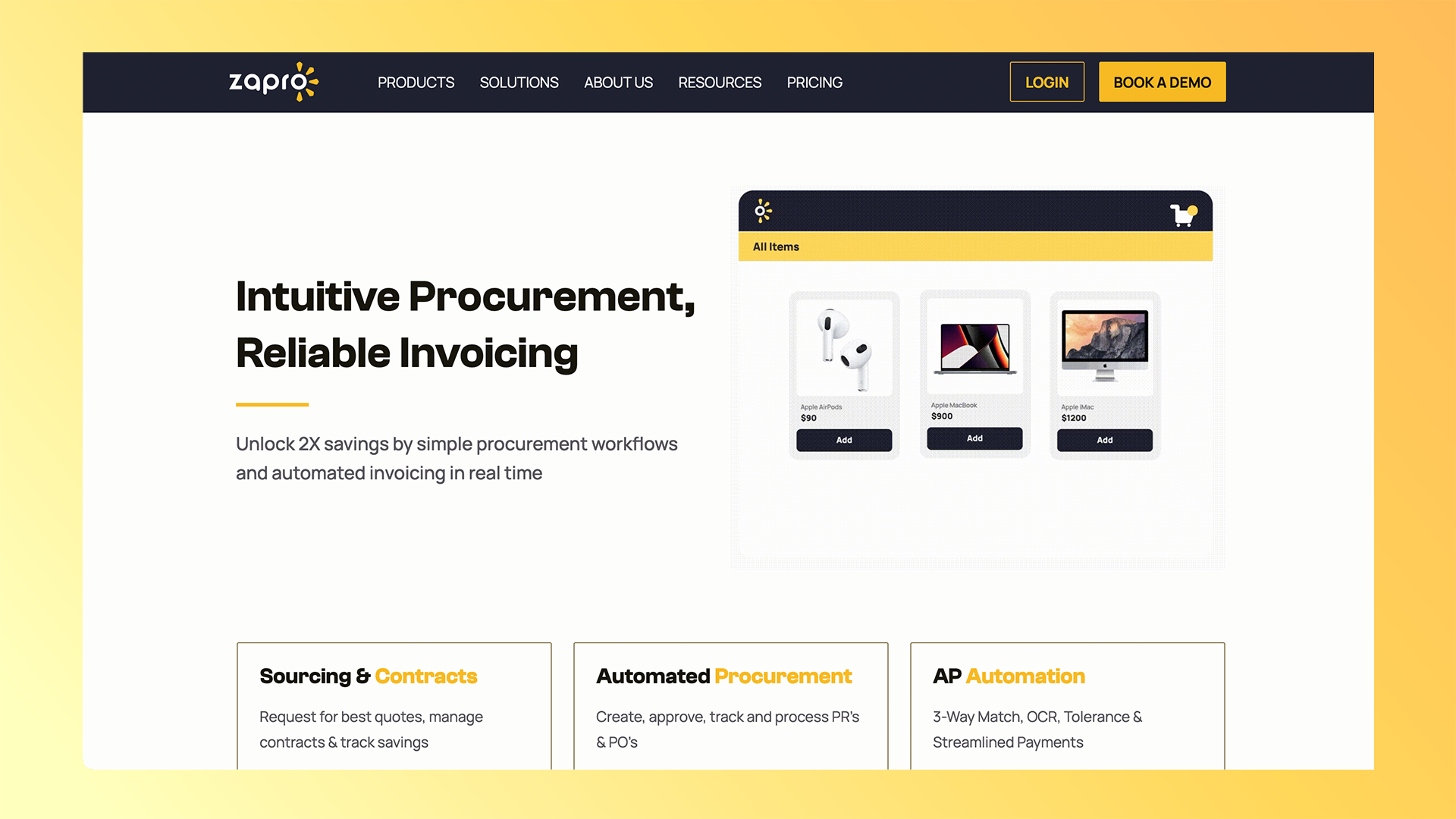Managing vendors and suppliers is a critical aspect of running a successful business. From tracking orders and monitoring performance to negotiating contracts and ensuring timely deliveries, efficient vendor management is essential. Fortunately, in today’s digital age, there are numerous vendor management solution available that can streamline these processes and help businesses take control of their supplier relationships. In this article, we will explore the 11 best vendor management platforms for businesses in 2024.
Table of Contents
- Zapro
- SAP Fieldglass
- Genuity
- Gatekeeper
- Precoro
- Beeline
- Onspring
- ClickUp
- Connecteam
- Tipalti
- Procurify
1. Zapro

Zapro stands as a premier vendor management and procurement software solution, offering an extensive array of features and cutting-edge automation capabilities to streamline vendor operations and procurement processes. With Zapro, businesses gain full control over their vendor network, encompassing contract management, compliance monitoring, and performance evaluation, while also optimizing procurement workflows. The platform facilitates direct vendor payments, streamlines onboarding and offboarding procedures, and delivers real-time analytics and customizable dashboards for actionable insights into both vendor relationships and procurement spend.
Zapro boasts seamless integration with a wide range of applications and systems, ensuring effortless connectivity and enhanced productivity for businesses across all sectors. Additionally, Zapro prioritizes security and scalability, providing robust solutions tailored to meet the evolving needs of modern enterprises in both vendor management and procurement.
Pros:
- Vendor onboarding and contract management tools
- Real-time analytics and reporting capabilities
- User-friendly interface and customizable workflows
- Meeting tracking and attendee participation monitoring
- Agenda management and meeting minutes recording
- Performance monitoring through SLA and KPI dashboards
- Utilization of balanced scorecards for evaluation
- Development of service enhancement plans
- Management of contracts and escalation processes
- Oversight of change control procedures
- Generation of expenditure reports
- Gathering feedback from key stakeholders through surveys
- Centralized database for vendor documents storage and organization.
- Ensure vendor security and compliance through thorough background checks.
- Manage vendor risks with specialized software tools.
- Evaluate vendors based on ESG criteria to align with organizational goals.
- Facilitate ISO compliance and streamline audit processes.
- Automated alerts for contract and certification renewals.
- Address vendor performance gaps for continuous improvement.
2. SAP Fieldglass
SAP Fieldglass is a leading vendor management solution that offers a comprehensive set of features and advanced automation capabilities. With SAP Fieldglass, businesses can manage every aspect of their vendor network, from contract management to compliance and performance tracking. The platform allows for direct payment to vendors, automates onboarding and offboarding processes, and provides real-time analytics and dashboards. SAP Fieldglass also offers an extensive list of integrations, making it easy to connect with other applications and systems.
Pros:
- Excellent customer service and platform support
- Digital Partner Network for hiring new vendors
- Robust list of integrations
Cons:
- Some companies may find the platform overwhelming due to its extensive features
- Higher subscription costs compared to other vendor management platforms
3. Genuity
Genuity is a vendor management solution specifically designed for IT companies. It offers a range of IT-specific tools, including help desk automation, telecom expense management, and network monitoring. Genuity is known for its affordability, making it an excellent choice for businesses on a tight budget. The platform integrates with various platforms like AWS, Salesforce, and G Suite, and provides access to an online marketplace for finding new software vendors and discounted hardware.
Pros:
- IT-specific tools for managing vendor relationships
- Affordable pricing with unlimited users
- Easy-to-use interface
Cons:
- Limited features compared to other platforms
- Not suitable for non-IT teams
4. Gatekeeper
Gatekeeper is an enterprise-level vendor management solution that offers unlimited user seats, fast implementation, and robust security features. The platform allows businesses to track every aspect of the vendor lifecycle, automate onboarding processes, and use eSignatures for contract approval. Gatekeeper’s Kanban Workflow Engine streamlines data entry, manages service level agreements (SLAs), and builds records automatically. The platform is cloud-based and integrates with over 220 third-party applications.
Pros:
- Completely cloud-based platform
- Extensive integrations with third-party platforms
- Discounts available for certain companies
Cons:
- Higher pricing for enterprise-level plans
- Annual payment required for plans
5. Precoro
Precoro is an affordable vendor management solution suitable for small- and medium-sized businesses. It offers features such as vendor contact management, contract management, and performance reporting. Precoro also includes procurement tools like purchase request tracking and budget management. The platform provides comprehensive customer support, including dedicated customer success managers and personalized training. Precoro integrates with platforms like QuickBooks Online, Xero, and NetSuite.
Pros:
- Low-cost option for companies with fewer than 20 users
- Access to lifetime product updates
- Easy to navigate and set up
Cons:
- No direct vendor payment feature
- Lack of compliance management functionality
6. Beeline
Beeline stands out for its extensive integration capabilities, boasting a 100% success rate with customer integrations. The platform allows businesses to streamline vendor management, procurement, staffing, and other related processes. Beeline offers standard vendor management features such as resource tracking, services procurement, contract management, and vendor compliance. The platform also includes a Direct Sourcing tool for finding and hiring talent directly. Pricing information for Beeline is available upon request.
Pros:
- Expansive integrations with any platform
- Variety of tools for vendor management and procurement
- Direct talent sourcing from the platform
Cons:
- Pricing information not provided online
- Implementation may require additional training
7. Onspring
Onspring stands out for its exceptional customer support and training opportunities. The platform offers virtual training sessions, boot camps, and weekly classes to help users maximize the platform’s features. Onspring’s vendor management solution centralizes vendor information and contracts, automates processes, and provides real-time analytics. The platform is user-friendly with a drag-and-drop interface, and it allows users to build dashboards and workflows without IT support. Pricing information for Onspring is available upon request.
Pros:
- Great customer service and in-depth training
- Used by big-name companies
- User-friendly drag-and-drop interface
Cons:
- Functionality may be limited for some users
- No direct vendor payment feature
8. ClickUp
ClickUp is an all-in-one productivity platform that includes vendor management capabilities. It offers templates and checklists for managing contractors, vendor master lists, contracts, and business agreements. ClickUp’s AI writing assistant can speed up vendor management workflows and communication. The platform also includes resource management tools, custom digital forms, and integration capabilities with leading resource tools like Jira and HubSpot.
Pros:
- AI writing assistant for efficient vendor management
- Vendor master list template for easy vendor management tasks
- Integration with various resource management tools
Cons:
- Limited critical features on the mobile version
- Steep learning curve initially
9. Connecteam
Connecteam is a vendor management system designed for the deskless workforce, including healthcare professionals, construction workers, and waiters. While not primarily designed for vendor management, Connecteam offers features like document management, onboarding, and task management that can be utilized for vendor-related tasks. The platform includes internal communication tools, reporting capabilities, and a digital phonebook for organizing vendor contacts.
Pros:
- Internal communication via in-app chat
- Reporting through checklists and forms
- Digital onboarding courses for vendor training
Cons:
- Upgrades required for critical features
- Occasional lag when uploading large picture files
10. Tipalti
Tipalti is a comprehensive accounts payable automation platform that includes vendor management features. It offers tools for onboarding vendors, managing payment operations, and ensuring compliance with tax regulations. Tipalti automates payment processes, reduces errors, and provides real-time visibility into vendor payments and transactions. The platform also includes fraud prevention measures and integrates with various accounting and ERP systems.
Pros:
- Accounts payable automation for efficient vendor management
- Payment operation management and compliance features
- Fraud prevention measures
Cons:
- Pricing information not provided online
- Limited information on specific vendor management features
11. Procurify
Procurify is a spend management system that helps businesses manage their spending more efficiently. The platform includes features for requesting, approving, and controlling purchase orders. Procurify provides integrations with platforms like QuickBooks, Slack, and NetSuite, and offers custom reports for analyzing purchasing data. The platform also includes inventory management tools and the ability to add or invite suppliers.
Pros:
- Purchase request creation and management
- Integrations with popular platforms
- Supplier and stock planning and control
Cons:
- Clunky receipt and purchase order workflow
- Limited supplier base customization
Conclusion
Vendor management solution play a crucial role in helping businesses manage their vendor relationships efficiently. Whether you’re a large enterprise or a small business, there are vendor management solutions available to suit your specific needs. By leveraging the features and capabilities of these platforms, businesses can streamline their vendor management processes, improve efficiency, and ultimately achieve better business outcomes.
Looking for a reliable and customizable vendor management solution? Look no further than Zapro. With its comprehensive suite of features and user-friendly interface, Zapro can help businesses of all sizes take control of their vendor relationships. From vendor onboarding to contract management and performance tracking, Zapro provides the tools you need to streamline your vendor management processes. Contact Zapro today to learn more about how their platform can benefit your business.
